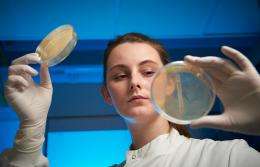Justine Rudkin examines bacterial plates
(Medical Xpress) -- An MRSA expert from the University’s Department of Biology & Biochemistry has warned that a new, more toxic strain of the disease poses a serious threat to people in Britain as it migrates from the United States.
MRSA can be split into two groups, based on where the person became infected. Typically, people in Britain become infected with MRSA in a hospital environment, when they are already sick and have a reduced ability to fight the bacteria.
Hospital acquired MRSA has been causing problems for decades and some success has been had in reducing infections in recent years. However, Dr. Ruth Massey is concerned about the emergence of a new MRSA bacterium over the past few years in the United States that is capable of infecting healthy people in the community.
Dr. Massey’s research, which has recently been published in the Journal of Infectious Disease, focused on why MRSA bacteria found in hospitals has not been able to migrate into the community, by comparing the hospital acquired bacteria with those causing community acquired infections.
Dr. Massey said: “Our research found that the composition of the cell wall of the bacteria is critical to the community acquired bacteria being more toxic.
“The ability of the MRSA bacteria to secrete toxins is one of the main ways it causes disease. Using a sensing system, it carefully controls when it switches on its ability to do this, so as not to cause disease until it is firmly established within the human.
“Many antibiotics target the cell walls of harmful bacteria, and to resist this, the bacteria have to make changes to their cell wall. We found that the sensing ability of the cell wall in hospital acquired MRSA bacteria is affected by these changes, causing them to reduce the amount of toxins they secrete when antibiotics are present. This means that the hospital strains cannot be both toxic and antibiotic resistant.”
However, the newer community acquired MRSA strains infect healthy people, where the composition of their cell walls is different, allowing them to sense their environment and switch toxin expression on at the right time.
Justine Rudkin, a PhD student working on the project, said: “The community acquired bacteria has evolved further, and is able to maintain a higher level of toxicity while also resisting treatment from antibiotics, making it a much larger problem. In the United States MRSA is the highest single cause of death from infectious disease, where it usually manifests itself as a skin infection that can result in abscesses, lethal cases of pneumonia and blood infections.
“While we are constantly learning more about MRSA, there is a serious threat posed by this newer strain of bacteria capable of causing disease and even death in perfectly healthy people. We need to respond seriously to this threat as it reaches Britain from the United States.”
Dr. Massey’s research into MRSA is funded by the Biotechnology & Biological Sciences Research Council (BBSRC) and the Medical Research Council (MRC). The research group is now looking for further funding to research potential treatments for community acquired MRSA.
Provided by University of Bath


















